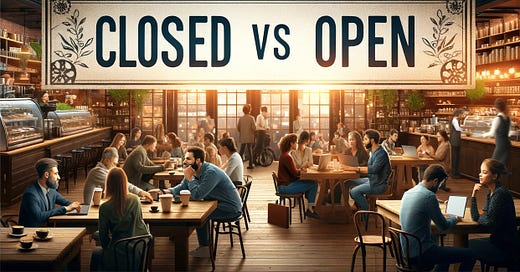Morning y’all!
The mudslinging will never end when it comes to artificial intelligence and whether or not the people, projects, and companies that build it are moving towards a more closed source or open source stance.
This week the headlines are all swirling around Elon Musk’ promise that Grok, their version of generative AI, is headed toward open:
This is, of course, in contrast to OpenAI which is most definitely a closed source project. But here’s the question: Does it really matter?
Well here’s my hot take: It doesn’t matter.
You see, I’ve been part of the open source community from the very beginning of my career and my first company that I started was built upon open source — I built an technology consulting and web development agency using WordPress as our technical stack and eventually converted the entire organization from a service-driven company to a product-centric one. I eventually sold one part of it to the founders of WordPress and the other part to a web hosting company that specializes in WP.
And then I went ahead and worked for closed source companies, large and small, and then even built a few more closed source projects as well. I’ve done it all.
What I learned is that the adoption of a technology doesn’t depend on how open or closed it is. Rather, it’s the principles of capitalism that drive innovation and, more specifically, the Austrian view of economics which suggests that the entrepreneurial and business function is to experiment with a combination of factors (of production) to find those that produce the greatest economic value.
The result is that open and closed source projects, combined, drive the growth of business, innovation, and ultimately the human race. Incentives and outcomes, as Charlie Munger would say. And this has really never changed.
In a lot of ways the issue between Elon and OpenAI is fundamentally one about of incentives. It’s not really an ethical or morality play, although folks are framing it like that. And whether you like it or not both for-profit and not-for-profit companies are interested in the same thing: Growth.
But one can easily get caught up in the narratives, most strongly the one focused on AI destroying humanity as we know it.
I like this meme quite a bit and it encapsulates how I think about this rightly:
Folks are worried that AI is going to take their jobs and that’s a very reasonable and logical worry. They believe that “AI is going to replace me” and that I’m going to lose my job and the income that I need to survive.
But AI isn’t here to take jobs. Rather, it’s here to make our jobs and life easier. It automates processes, not people. It’s focused on tasks, especially the repetitive ones, opening up new opportunities for incredible time savings that should free humans up to do even better and more creative work.
And it’ll do this whether it’s open or closed. You can believe it because every device is going have it embedded deep within. No fear is necessary and no practical, ethical dilemma is present. Technology is technology. The open and closed debate is about growth, competition, and profits. Let’s not get it twisted.
I’ve seen it all before. It’s all good.
※\(^o^)/※
— Summer
A few links and apps and news that you might have missed:
Game devs are excited about AI NPCs.
Sarah Guo and Elad Gil recap AI in 2024.
Generate courses with AI.
An AI writing assistant for Chinese.
AI avatar of Marilyn Monroe at SXSW.
AI answers, insights, and identification for your photos with Picurious.
Generate course outlines in minutes with EverLearns.
AI-assisted for 3D game development with Charmed.
AI marketing assistant.
Browser interaction AI tool.







